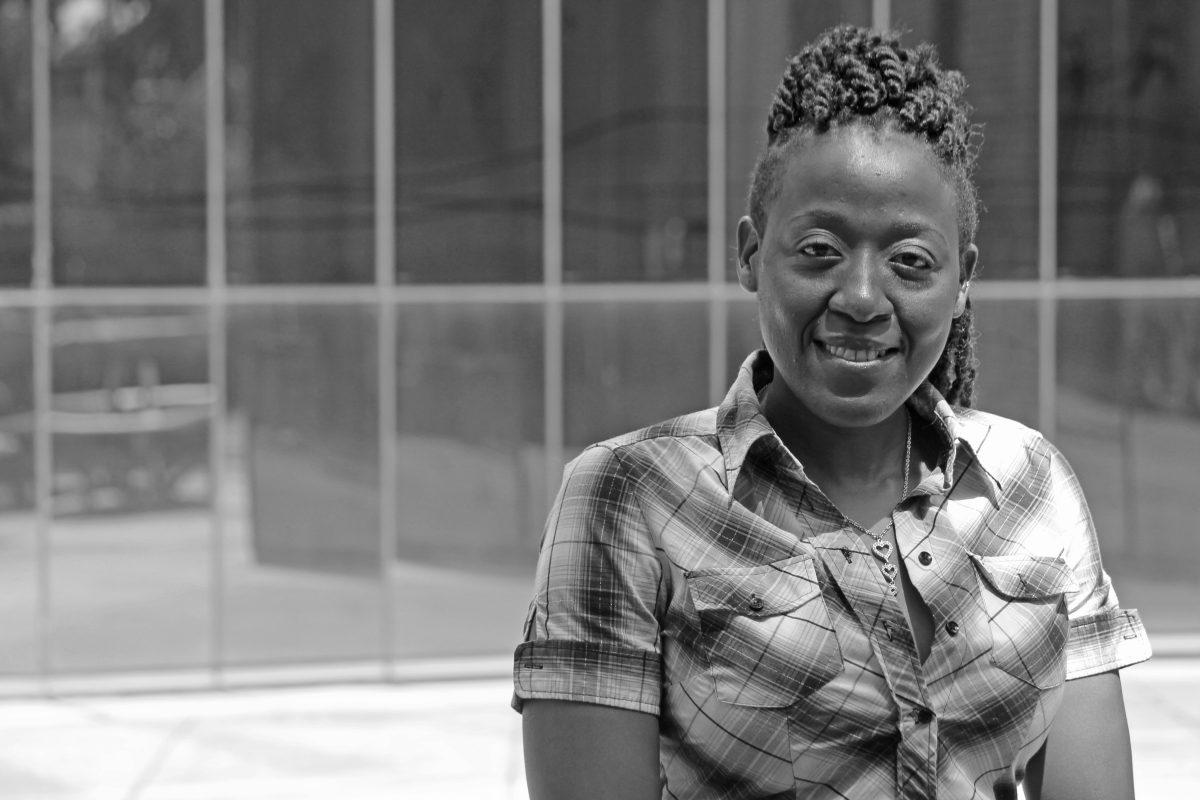
Keenan Hairston
Yvette Nkunde-Bose, a senior student here at NC State studying Biochemistry, is from Rwanda. She sat down with us for a bit to share her story Aug. 26 2014. Photo by Keenan Hairston
Trigger warning: genocide, rape,body horror.
Twenty years ago a massive genocide killed about 1 million people in Rwanda. Miraculously, Yvette Nkunde-Bose, a senior in biochemistry survived.
The genocide began April 6, 1994 after the assassination of Rwandan President Juvenal Habyarimana, who tried to improve relations between the Hutu and Tutsi tribes, according to Nkunde-Bose.
“The bottom line is when he died everyone got mad, and they started killing each other,” Nkunde-Bose said.
The slaughter, rape and decimation she witnessed during those events still haunt her to this day, Nkunde-Bose said. She suffers from post-traumatic stress disorder, which often leave her eyes red and puffy as she cries out for help whilst in the middle of her nightmares, Nkunde-Bose said.
Intensive counseling made her condition worse, since it triggered painful memories instead of helping her face them, according to her.
“I decided to not do counseling and not take medication because it turned me into a different person, and I was not liking that,” Nkunde-Bose said. “I decided to just shut down and didn’t want to talk about it for a while, but I think that deciding not to talk is not necessarily helpful.”
Now 24, Nkunde-Bose said she finally has the courage to tell her story in the hopes that it will help others. She started a blog this summer, which gives a surprisingly detailed account of what she experienced despite being only four years old at the time.
“I’ve gone through a lot of things, and I feel like if I tell my story, someone else can learn from it and be a better person or have an awareness that other people are suffering out there,” Nkunde-Bose said.
Traumatic memories
In her blog, she also wrote about how she lost her friend.
Both girls snuck out of their homes to see each other, despite their parents’ warnings to stay inside. A group of men saw them and proceeded to rape Nkunde-Bose’s friend in front of her eyes, after which they spread out her legs and sliced her body in two, Nkunde-Bose stated in her blog.
“At that point I wanted to die,” Nkunde-Bose said. “You know after they did all of those things I was ready. I had prayed and given my life to God and I was ready…I had no fear anymore, and I just surrendered.”
But she didn’t die.
Instead, she, along with family and friends, fled to the Democratic Republic of Congo, where locals poisoned the food and water supply in order to kill the Rwandan refugees, Nkunde-Bose said. Luckily, they had no money for food.
She stayed there for three years, surviving on United Nations rations and working as a slave to make money for food, Nkunde-Bose said.
Then, the new Rwandan government pushed the Rwandans into the jungle, where she lived for a month, according to Nkunde-Bose.
“They forced us into a forest that had killer animals, like lions and tigers, and they forced us in there to die,” Nkunde-Bose said.
When they arrived in the jungle, though, the lions disappeared, which Nkunde-Bose said she attributes to the power of God.
A lot of people lost their lives in that jungle, including infants, because there was no food or water, according to Nkunde-Bose.
After a few men cut a path through the forest to Rwanda, she returned to her country for another three years but still found no safety, according to Nkunde-Bose.
She and her sister then walked to Zambia, where a family took them in and sponsored them to go to the United States for a better life and education.
“I started in a children’s home, and I was bullied because I’m a villager, I work in the village, and I didn’t know how to wear heels. I didn’t know fancy food…they would say I was ugly, I’m clueless,” Nkunde-Bose said. “At times I started believing I was ugly. I mean they looked good, and I looked different.”
The inferiority she said she felt, though, drove her to learn as much as she could, according to Nkunde-Bose. She progressed to advanced English proficiency in a few months, and now speaks fluent Spanish.
Eventually a family in Michigan adopted her, Nkunde-Bose said.
“When I was with them, I never once felt like I was someone else’s child,” Nkunde-Bose said. “These people were loving me unconditionally. At times I felt like they were loving me more than their own kids. They instilled confidence in me, they told me how beautiful I was, they made me feel special…”
In the future, Nkunde-Bose said she hopes to become a traveling doctor. In addition, she said she wants to teaching others what her experiences have taught her.
“I wanted to let people know that no matter how little you have it here, it is a lot to some people,” Nkunde-Bose said. “You are rich to some people; you are wealth to some people. There are some people who would wish to be in your shoes, but they are not able to, so love life as it comes, and don’t stress for more, but rather appreciate and enjoy what you have, and know that there are people who have less than you and wish to have what you have.”
To follow Nkunde-Bose’s blog, visit www. strengthenedbytragedies.com